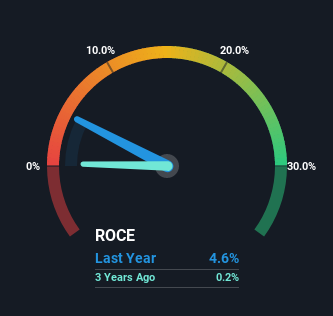- Malaysia
- /
- General Merchandise and Department Stores
- /
- KLSE:PARKSON
The Return Trends At Parkson Holdings Berhad (KLSE:PARKSON) Look Promising
What are the early trends we should look for to identify a stock that could multiply in value over the long term? Firstly, we'd want to identify a growing return on capital employed (ROCE) and then alongside that, an ever-increasing base of capital employed. If you see this, it typically means it's a company with a great business model and plenty of profitable reinvestment opportunities. With that in mind, we've noticed some promising trends at Parkson Holdings Berhad (KLSE:PARKSON) so let's look a bit deeper.
Understanding Return On Capital Employed (ROCE)
For those who don't know, ROCE is a measure of a company's yearly pre-tax profit (its return), relative to the capital employed in the business. Analysts use this formula to calculate it for Parkson Holdings Berhad:
Return on Capital Employed = Earnings Before Interest and Tax (EBIT) ÷ (Total Assets - Current Liabilities)
0.046 = RM267m ÷ (RM9.5b - RM3.7b) (Based on the trailing twelve months to December 2021).
Therefore, Parkson Holdings Berhad has an ROCE of 4.6%. Even though it's in line with the industry average of 5.1%, it's still a low return by itself.
See our latest analysis for Parkson Holdings Berhad

Historical performance is a great place to start when researching a stock so above you can see the gauge for Parkson Holdings Berhad's ROCE against it's prior returns. If you'd like to look at how Parkson Holdings Berhad has performed in the past in other metrics, you can view this free graph of past earnings, revenue and cash flow.
How Are Returns Trending?
Shareholders will be relieved that Parkson Holdings Berhad has broken into profitability. While the business was unprofitable in the past, it's now turned things around and is earning 4.6% on its capital. On top of that, what's interesting is that the amount of capital being employed has remained steady, so the business hasn't needed to put any additional money to work to generate these higher returns. So while we're happy that the business is more efficient, just keep in mind that could mean that going forward the business is lacking areas to invest internally for growth. After all, a company can only become a long term multi-bagger if it continually reinvests in itself at high rates of return.
In Conclusion...
To bring it all together, Parkson Holdings Berhad has done well to increase the returns it's generating from its capital employed. Although the company may be facing some issues elsewhere since the stock has plunged 81% in the last five years. Regardless, we think the underlying fundamentals warrant this stock for further investigation.
One more thing: We've identified 4 warning signs with Parkson Holdings Berhad (at least 1 which makes us a bit uncomfortable) , and understanding these would certainly be useful.
For those who like to invest in solid companies, check out this free list of companies with solid balance sheets and high returns on equity.
New: Manage All Your Stock Portfolios in One Place
We've created the ultimate portfolio companion for stock investors, and it's free.
• Connect an unlimited number of Portfolios and see your total in one currency
• Be alerted to new Warning Signs or Risks via email or mobile
• Track the Fair Value of your stocks
Have feedback on this article? Concerned about the content? Get in touch with us directly. Alternatively, email editorial-team (at) simplywallst.com.
This article by Simply Wall St is general in nature. We provide commentary based on historical data and analyst forecasts only using an unbiased methodology and our articles are not intended to be financial advice. It does not constitute a recommendation to buy or sell any stock, and does not take account of your objectives, or your financial situation. We aim to bring you long-term focused analysis driven by fundamental data. Note that our analysis may not factor in the latest price-sensitive company announcements or qualitative material. Simply Wall St has no position in any stocks mentioned.
About KLSE:PARKSON
Parkson Holdings Berhad
An investment holding company, engages in the operation and management of department stores under the Parkson brand in Malaysia and internationally.
Good value with adequate balance sheet.
Similar Companies
Market Insights
Community Narratives




